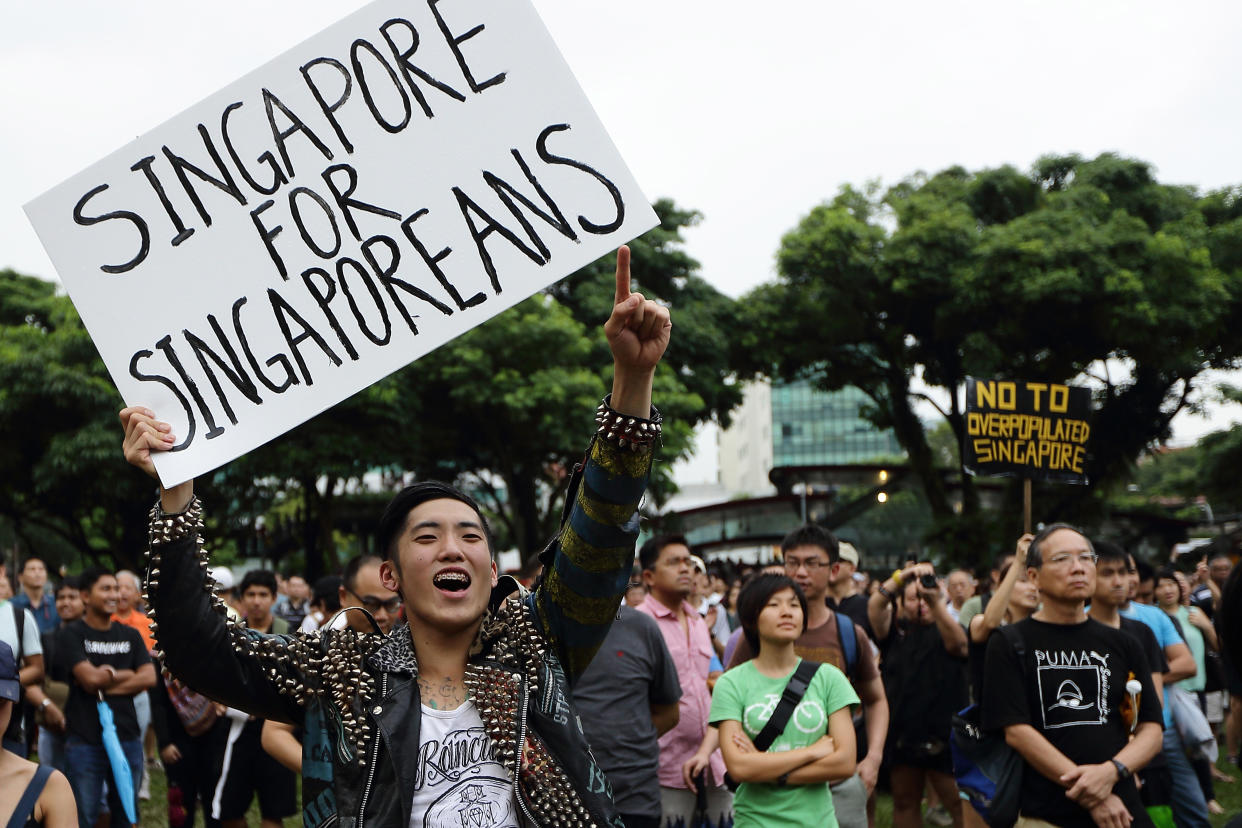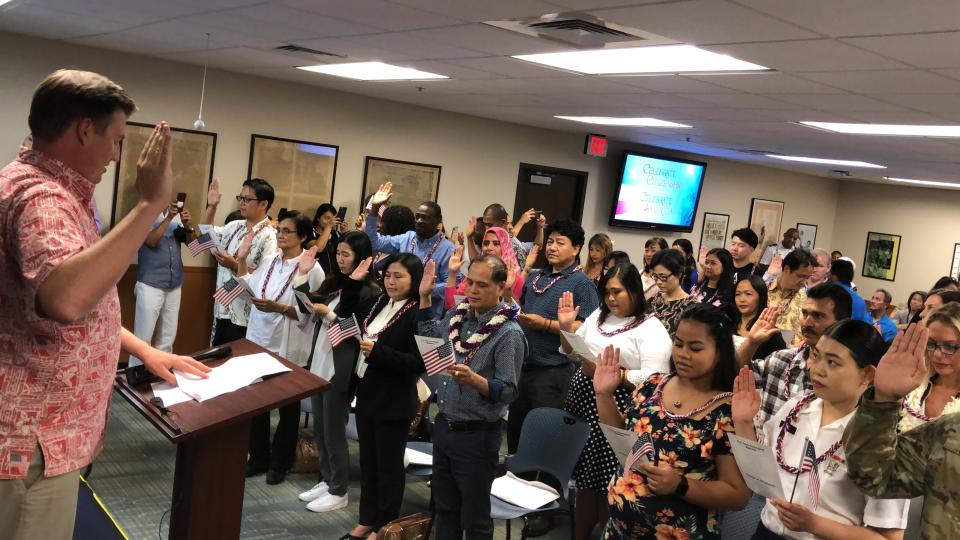COMMENT: Singapore immigration debate echoes global trend

SINGAPORE — Cast your mind back to the 2011 General Election, when the ruling People’s Action Party gained its lowest ever vote share post-independence, driven by discontent over a range of issues from MRT breakdowns to high housing prices.
One issue above all else struck a raw nerve: the presence of - apparently - too many foreigners in Singapore.
Opposition parties were quick to seize on Singaporeans’ discontent in 2011 and beyond, using very familiar rhetoric.
The Straits Times (ST) reported that at a 2013 by-election rally, then-Workers’ Party chief Low Thia Khiang charged that the influx of foreigners since 2005 was the root of many of the country’s problems. He added that the country was losing its sense of identity, and that foreign workers should not be allowed to take away the rice bowls of locals.
WP chair Sylvia Lim added, “Sometimes when I am crossing at traffic lights, I close my eyes and listen to people talking around me and can imagine myself living in a different country.”
More immigrants? No, thanks

Fast forward to 2019, where a global wave of anti-immigrant sentiment has partly led to the rise of populist leaders and far-right movements. A 2018 survey of 27 nations conducted by the Pew Research Centre showed little appetite worldwide for more migration, legal or illegal.
As a reflection of the aversion against immigrants, there has also been a global surge in border security infrastructure. Professor Reece Jones of the University of Hawaii at Manoa noted that at the end of World War II, there were just five border walls worldwide. In 2019, the number has jumped to 70, with three-quarters of them built in the last 15 years.
In the US, the Trump administration has even resorted to prosecuting ordinary citizens who provide humanitarian aid to illegal immigrants. For example, Arizona teacher Scott Warren was recently tried for human smuggling because he had provided two migrants with “food, water, clean clothes and beds”.
All visa applications for the US also now require interviews, causing delays and backlogs. “There is no doubt in my mind that this is deliberate in order to slow down the process,” said senior migration attorney and law academic John Egan.
What about Singapore?
In Singapore, there appears to be little danger of a far-right, anti-immigrant demagogue coming to power. Above all, the Republic does not have refugee issues to address: it has not hosted them since 1996, when the last of 32,000 Vietnamese refugees returned home. Since then, the authorities have maintained consistently that Singapore - as a small country with limited land - is not in a position to accept any refugees or asylum seekers.
Political temperatures surrounding immigration have also cooled considerably, thanks to the authorities successfully tackling outstanding issues like easing public transportation woes, and tightening immigration and foreign manpower policies.
With an election slated to be held possibly this year, if not next year, could anti-immigration sentiment once again come to the fore? There are long memories of the controversial 2013 Population White Paper, which projects population growth in the Republic to rise to as many as 6.9 million residents by 2030.
Budget 2019 saw a significant cut in the foreign worker quota for the services sector by 2021, in order to reduce its dependence on foreign labour and increase productivity. The move undercut the opposition’s arguments that the government is not addressing immigration concerns on the ground.
Singapore’s leaders often address the hot-button issue publicly and urge citizens to be receptive to foreigners living and working here. Speaking at an event in Nanyang Technological University (NTU) in March, presumptive future Prime Minister Heng Swee Keat told attendees, "We don't want a world where people build walls around themselves. Our pledge - regardless of race, language or religion - is not to be taken lightly… but really as a way of life for Singapore.
“Beyond that, we ought to deepen our understanding of other people... whether they are new immigrants, our immediate neighbours, students from NTU, National University of Singapore or other universities,” he added, according to an ST report.
Universal immigration issues

In this regard, my recent experience at the 2019 Jefferson Fellowships, where journalists from nine countries came together to examine immigration issues in Honolulu, Seoul, Manila and Sydney, was instructive.
At the end of our three-week trip (organised by the East-West Centre), we conducted a lengthy discussion on what we had learned from our meetings with government officials, NGOs, refugees and asylum seekers.
Among our conclusions: there was a commonality of concerns across the four countries we had visited, centred on fear - real or imaginary: of invasion, crime, terrorism, and immigrants taking away jobs and radically altering their new countries of residence.
As Associate Professor Jennica Larrison of the University of Baltimore, Maryland told us, “Immigration is used as a scapegoat for a lot of other issues.” The facts demonstrate that it is not immigrants that are taking jobs, but automation, added Prof Larrison.
But even in South Korea, traditionally resistant to welcoming outsiders, authorities are being forced to seriously consider opening the doors to immigrants, as it has one of the lowest birth rates in the world.
Kim Yeong Geun, Director General of Immigration Policy, told journalists through a translator, “Each government ministry is being prepared for a population decrease, and the No. 1 solution being discussed is immigration.”
A nation of immigrants
There is little doubt that Singapore leans heavily on immigrants and migrant workers to keep its economy humming.
As of end-June 2018, 38 per cent of Singapore’s 5.64 million population were non-citizens. They comprise over half a million permanent residents and more than 1.6 million non-residents. The latter group includes domestic workers, Employment Pass holders, S-Pass holders, students and more.
One suspects that it will not take all that much to reignite passions over immigration, given the frequency of derisory online comments about “foreign talent” and the like. Just like everywhere else, tensions between the so-called native born and the new arrivals are always bubbling beneath the surface.
But as a nation of immigrants with a plurality of cultures and religions, Singaporeans should know full well the dangers of drawing lines between ‘us’ and ‘them’. A failure to manage the contentious issue could result in wider fault lines among its citizens and foreigners, and threaten the social cohesion that it has carefully cultivated over the decades.
More commentaries
COMMENT: Unequal access and self-censorship reign in Singapore journalism
COMMENT: Singapore’s fake news law may need a reboot some time in future
COMMENT: Singapore’s online falsehoods bill will deepen culture of self-censorship



